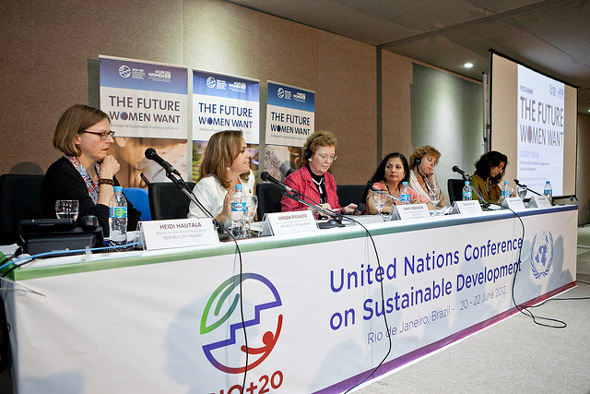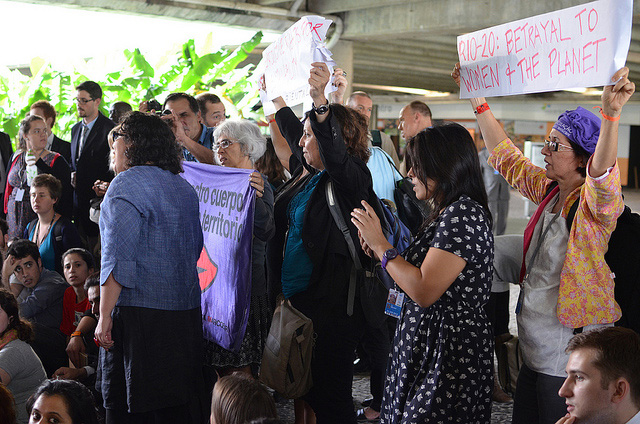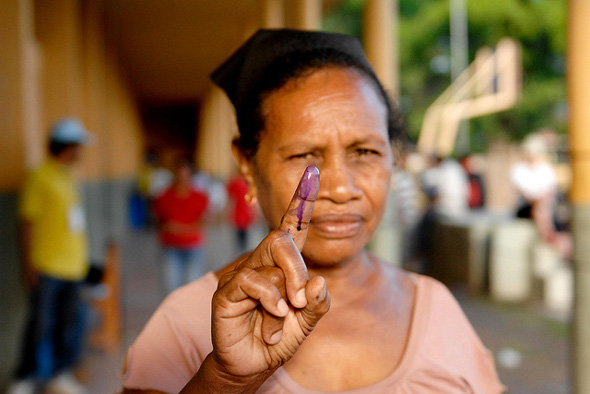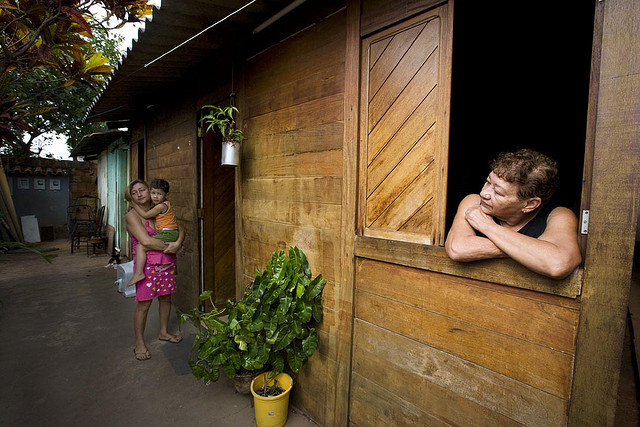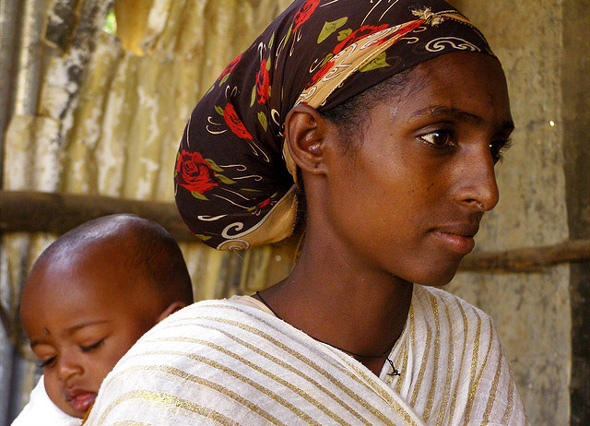Showing posts from category Pop at Rio+20.
-
Pop at Rio+20: Despite Failure Narrative, Progress Made at Rio on Gender, Health, Environment Links
›July 13, 2012 // By Sandeep BathalaA month ago this weekend I boarded a plane to Rio de Janeiro for the UN Conference on Sustainable Development. Over the past few weeks, I have had some time to reflect on the amazing (and exhausting) experience afforded to me. Unfortunately, the final Rio+20 outcome document (considered by some to be misnamed as “The Future We Want”) failed to recognize the connections between reproductive rights and sustainability. However, since I returned I’ve also found myself in conversations with colleagues eager to celebrate the successes of the conference.
Jason Bremner, program director at Population Reference Bureau, reminds me that the initial “zero draft document” that was circulated prior to Rio had absolutely no mention of reproductive health, family planning, or population. “Though the ultimate conference document wasn’t a success by many measures, I commend the efforts of the many advocacy organizations that resulted in the inclusion of reproductive health and family planning as a key aspect of sustainable development,” he said.
Other wins were recognized at Rio as well. On a panel organized by the International Planned Parenthood Federation, Brazilian Minister of Policies for Women Eleonora Menicucci de Oliveira pointed out that the presence of women this year was much stronger than at the 1992 conference. And she stressed that the overall importance placed on the reduction of poverty will have a big impact for women.
Though the official language was weakened in the final outcome document, there was much more support expressed at side events and off the record conversations. Speaking at the same event as Oliveira, Christian Friis Bach, Minister for Development Cooperation in Denmark, said that “one leader after another has stood up for reproductive rights, and we’ve started a campaign which will go on until ICPD+20.”
In fact, as the Wilson Center’s Brazil Institute Director Paulo Sotero points out, there was a great deal of progress made by non-government representatives alongside the main conference:I left Rio more hopeful about the future than the official part of Rio+20 would allow. As governments clearly fumbled in the face of the complex challenges of imagining and building a more equitable and sustainable economic growth model in the decades ahead, I saw senior business executives and leaders of civil society engaged in intelligent and productive dialogue about difficult issues at hundreds of thematic panels held at the Corporate Sustainability Forum and other sessions held in Rio.
I felt the same energy. And many groups there seemed to already be planning for next steps.
On the first day of side events I attended, members of the Population and Climate Change Alliance discussed strategies to ensure that in the post-2015 (i.e. post-Millennium Development Goals) international development agenda sexual and reproductive health and rights are explicitly recognized as core to sustainable development. The panel included Mialy Andriamahefazafy of Blue Ventures Madagascar, Joan Castro of PATH Foundation Philippines, Inc., and Negash Teklu of PHE Ethiopia Consortium, who all shared examples of efforts in their countries to integrate reproductive health with other sustainable development programs.Joan Castro on PATH Foundation’s work in the Philippines
The Rio+20 conference was, at the very least, a re-affirmation of the tenets set down by the ‘92 Earth Summit – that is, that there is middle ground between full-tilt economic development and uncompromising environmentalism, called “sustainable development,” and we ought to be moving towards it. It was also a fantastic gathering place for disparate groups of people to come together on to similar issues and to build momentum and networks on their issues.
For those hoping to see a stronger link recognized between reproductive rights, population, and the environment, the good news is that elsewhere, awareness and momentum seems to be growing. Just this week, The Bill and Melinda Gates Foundation joined the United Kingdom, United States, France, Germany, the Netherlands, South Korea, Norway, Sweden, and Australia to pledge more than $2.6 billion towards meeting global unmet for contraceptives. And the connection to development was explicit: “Contraceptives are one of the best investments a country can make in its future,” reads the summit website.
Coincidence to have followed so closely behind a “disappointing” Rio outcome? Perhaps not.
Sources: The Bill and Melinda Gates Foundation, Estado, UN Conference on Sustainable Development.
Photo Credit: “UN Women Leaders Forum at Rio+20,” courtesy of UN Women. -
Pop at Rio+20: Reproductive Rights Missing From Outcome Document – Assessing the Disappointment
›June 22, 2012 // By Sandeep Bathala
As heads of state get ready to sign on to the outcome document here in Rio, all eyes are on next steps – especially for the reproductive health and integrated development communities, which have seen their hopes of mainstreaming their issues with the sustainable development agenda dashed.
The final outcome document can be found here. USA Today reports that opposition from a group of countries in the 11th hour stripped the text of critical reproductive rights language:An initial draft of this conference’s outcome document stated, “We are committed to ensure the equal access of women and girls to education, basic services, economic opportunities, and health care services, including addressing women’s sexual and reproductive health and their reproductive rights.”
Absent entirely is any explicit connection between reproductive rights, population dynamics, and sustainable development.
In the final draft, the stronger wording “We are committed to ensure the equal access” was switched to the weaker “We are committed to promote the equal access.” The reference to reproductive rights was deleted altogether, after opposition from the G-77, a negotiating bloc of developing countries at the United Nations, and the Holy See.
But others, as we have heard repeatedly throughout the conference, insist that gender issues and reproductive rights have a strong and vital connection to sustainable development. Yesterday, USAID, the Aspen Institute, and the Center for Environment and Population held a discussion in the U.S. tent on this very issue, titled “Making Population Matter: The Demographic Dividend and Sustainable Development.”
As Vicky Markham of the Center for Environment and Population reports on RH Reality Check, the side-event aimed to demonstrate the effects of population dynamics, both positive and negative:We have the largest youth demographic ever in the history of the world, and most developing nations have a “youth bulge.” This can be seen as a challenge, or opportunity, particularly if the focus is on providing development programs for child survival, family planning, reproductive health, and education. The importance of women’s empowerment was also central. But it’s not a given; it’s an opportunity only if we pay attention to these issues to increase the benefits of the “demographic dividend.”
The demographic dividend, as described by USAID Deputy Administrator and panelist Donald Steinberg in blog post earlier this week, “is an opportunity that arises when a country transitions from high to low rates of fertility and child and infant mortality.” But it’s not just about ensuring access to family planning and reproductive health; youth-focused economic and education policies are also needed: “Maximizing the dividend requires social and economic policies that reinforce inclusion, equity, and opportunity across the entire population,” he writes. USAID is making a point of creating youth-focused policies for this reason, he said in Rio.
Carmen Barroso, regional director of the International Planned Parenthood Federation’s Western Hemisphere Region, pointed out that Latin American countries could not take advantage of the demographic dividend before recent societal changes occurred, including decreased fertility, increased urbanization (which leads to smaller families), and greater schooling and employment of women.
Seventy percent of world population growth is likely to be generated by Africa this century, said Eliya Msiyaphazi Zulu, executive director of the African Institute for Development Policy – and it is the only continent projected to continue to grow in the next century, he said. He called for redefining growth as more than GDP as that measure does not consider environmental degradation and its costs: “We must have other means to measure development.”
As heads of state and negotiators consider their positions at this conference – which many were hoping would make a much stronger statement – they might do well to ponder today’s comments from Secretary of State Hillary Clinton:While I am very pleased that this year’s outcome document endorses sexual and reproductive health and universal access to family planning, to reach our goals in sustainable development we also have to ensure women’s reproductive rights. Women must be empowered to make decisions about whether and when to have children. And the United States will continue to work to ensure that those rights are respected in international agreements.
Sources: RH Reality Check, UN, U.S. Department of State, USA Today, USAID.
Now none of this is an abstract discussion. There is just too much at stake, too much still to be done. And many of you visited the U.S. Center here in Rio and saw practical solutions related to some of the work I’ve discussed and other goals we hold in common. We believe solutions require action by all of us. Governments, yes; let’s do our part. Let’s do more than our part.
Photo Credit: YouthPolicy.org. -
Pop at Rio+20: Text Finalized, Population-Sustainable Development Links Left Out?
›June 21, 2012 // By Sandeep BathalaWhile I was visiting with youth peer educators yesterday with the Brazilian Society for Family Welfare in the Cachoeirinha favela (see Vicky Markam’s post for details – we were on the same trip), UN member states reached consensus in the Rio+20 negotiations. But, according to reports, although the outcome document includes some mention of reproductive health, gender equality, and women’s empowerment, it fails to explicitly recognize the link between reproductive rights and sustainable development.
Many women’s rights and health observers have, from the start, encouraged this link.
Karen Newman, speaking to ECSP in April during the Planet Under Pressure conference – a precursor to Rio – said she hoped this week would offer an opportunity to look at “sustainable development in the round” and “re-identify family planning as a core development priority,” given its human rights and health implications and relationship to population growth.
Jenny Shipley (Former Prime Minister of New Zealand) wrote just yesterday on CNN that “we are at a moment in history where we still have time to make a difference. It is essential that the global discussion in Rio not be blind to the potential solutions that access to voluntary family planning could offer to many of the world’s problems.”
“We can no longer afford this outrageous oversight, driven by old-fashioned tradition, discrimination, and pure ignorance,” said Gro Harlem Brundtland (Former Prime Minister of Norway and Former Head of the World Health Organization) at a side event on Monday. “Now is the time to agree to unleash the largest untapped potential for sustainable development and stop all discrimination against women and girls.”
But now that preliminary agreement on the outcome text has been reached, reports have filed in that the connection many were hoping for is absent. Zonibel Woods, blogging on RH Reality Check, wrote:From the start of the negotiations, gender equality and women’s human rights, including reproductive rights, have continuously been challenged by a few governments, claiming that [these] had “nothing to do with sustainable development.”
The lack of consensus among the wider international community may also undercut efforts to highlight reproductive rights in the post-2015 Millennium Development Goals/Sustainable Development Goals framework and as governments ready for the follow-on to the International Conference on Population and Development in 2014. A concrete link to “sustainable development,” whatever form that takes, would help ensure that reproductive health is not side-lined.
This debate continued until the last few hours of the negotiations. In the end, the text includes a re-affirmation of both the Cairo and Beijing agreements, but it falls short by failing to recognize that reproductive rights are also critical to the achievement of sustainable development. If a woman cannot decide if and when to have children and if she is not provided with the reproductive health care that is her human right, it is challenging to contribute to sustainable solutions for the planet.
Immediately following the adoption of the text, women gathered and protested at Rio Centro, the main venue for the conference, and advocacy continues.
Heads of state will in all likelihood sign on to the outcome document by tomorrow (it could technically still be changed, but that appears unlikely). I will keep you posted on the final outcome and will be taking notes at a side-event this afternoon by USAID, the Aspen Institute, and Center for Environment and Population on the demographic dividend and sustainable development, which promises to be spirited given today’s news. You can tune in live to the webcast of that event at 2:30 EST on Ustream.
Sources: AllAfrica, Aspen Institute, CNN, IRIN, RH Reality Check, U.S. Department of State, USAID.
Photo Credit: United Nations Photo. -
Laurie Goering, AlertNet
Pop at Rio+20: Brazil a Model for Slowing Population Growth, Say Experts
›June 21, 2012 // By Wilson Center StaffThe original version of this article, by Laurie Goering, appeared on AlertNet.
Rosimere Lopes knows what she does not want in life.
The 23-year-old, who lives in Cachoeirinha, a hillside slum in Rio’s gritty North Zone, was born when her mother was just 16, and grew up taking care of her five younger brothers and sisters while her mother worked.
As a result of missing so much education, she’s still trying to finish high school. But she has accomplished one important thing – she has no children of her own yet, despite having a regular boyfriend.
“My mother got pregnant at 16 so I know the consequences. I don’t want that,” she said. “I want to do better.”
In the last decade, Brazil has undergone a family planning revolution. In 2000, the country’s birthrate was 2.4 children per woman, already dramatically down from decades past. Today it has dropped to 1.9 children, below replacement level and on a par with many developed countries.
That slowdown, built on making available better information and contraceptives, and on growing urbanization, is increasingly looked at as a model by experts around the world trying to find ways to dampen population growth and consumption – both linked to accelerating climate change and resource scarcity.
Continue reading on AlertNet.
Sources: UN Population Division.
Photo Credit: A grandmother, mother, and child in Brasilia, courtesy of flickr user babasteve (Steve Evans). -
Vicky Markham, RH Reality Check
Pop at Rio+20: Favelas and Protests
›June 20, 2012 // By Wilson Center StaffThe original version of this article, by Vicky Markham, appeared on RH Reality Check.
This morning I ventured the opposite direction from Rio Centro where the UN Rio+20 negotiations are taking place, and travelled with colleagues to the Cachoeirinha (I was told it means “waterfall”) favela in Rio de Janeiro. These shantytowns are quite common in Rio, well over one million strong, located within and around the city limits. This particular one has 37,000 residents.
We made the trip to visit the Brazilian Society for Family Welfare (BEMFAM) reproductive health and family planning clinic there, and were treated to a gathering of youth already discussing the facts of life, and more, with a BEMFAM counselor. This is especially poignant because youth in Brazil, similar to youth worldwide, are key to the issues we are debating here at the UN Rio+20 meetings just a few miles away. The Brazilian youth demographic, and the world’s, is the largest ever in history – it’s called the “youth bulge” – and from favelas, to cities, suburbs and rural areas everywhere, they represent the decision makers for the world’s future at all levels.
Here at the BEMFAM clinic, an affiliate of the International Planned Parenthood Federation’s array of family planning clinics worldwide, youth have weekly meetings and can come in daily if needed for their reproductive health needs. We entered to find about 25 adolescents sitting in a circle in very animated discussion about how they viewed sexuality, reproductive health, being young, their feelings and emotions about this period in their life. Through translators we learned so much from these adolescents and young adults, and once revealed I can’t help but feel how similar they are to our own youth. They cared about their friends, family, (how much their parents don’t know), going to college, getting jobs, raising families, school, and having fun. One glaring difference that emerged however is accessibility to many of their hopes and dreams – resources to come by any of their plans are scarce, and few will likely see college or even jobs from what they told us. This however did not make them dour or negative; they were bright, committed, compelling, cheerful, very well-spoken, and passionate about all they relayed to us.
Continue reading on RH Reality Check.
Photo Credit: “Riocinha Favela – Rio de Janeiro Brazil,” courtesy of flickr user David Berkowitz. -
Pop at Rio+20: Getting Women’s Rights on the Agenda
›June 19, 2012 // By Sandeep BathalaHere we are on my second day of side events at Rio+20 and the Aspen Institute, International Planned Parenthood Federation, and the United Nations Foundation convened a high-level moderated dialogue this morning to raise the profile of human development, gender, and reproductive health at the main conference.
Rio+20 is an unprecedented opportunity to draw attention to sustainable development and the role women’s rights and voices play in it. The Aspen/IPPF/UN Foundation event was timely as some negotiators are questioning the link between women and sustainable development in the 11th hour instead of reaffirming the commitments made 20 years ago at international conferences in Rio, Cairo, and Beijing.
High-level leaders, including Gro Harlem Brundtland (Former Prime Minister of Norway), Musimbi Kanyoro (President and Chief Executive Office of the Global Fund for Women), Tewodros Melesse (Director General of the International Planned Parenthood Federation), Mary Robinson (Former President of Ireland and President of the Mary Robinson Foundation – Climate Justice), and Tim Wirth (President of the United Nations Foundation), spoke to the role of women’s empowerment and family planning in the global discussion of sustainable development.
Some highlights from the meeting:
Brundtland noted that the next increment of economic growth could come fully from women’s empowerment. Family planning is a cross-cutting and cost-effective way to ensure this possibility.
Kanyoro further emphasized that for development organizations, women, more than any other partner, have the potential to enable sustainable growth.
Melesse discussed the role of addressing the special needs of young women. “If they are not met, we will have failed at sustainable development,” he said.
Robinson argued that family planning must be mainstreamed in international conferences, like Rio+20 and the annual UN climate COPs, as a human rights issue. Women’s issues cannot be add-ons in outcome documents – they have to be front and center. “We know what works,” she said, referring to effective reproductive health efforts and their ability to advance human rights and sustainable development
Wirth spoke passionately about the basic rules of diplomacy: do no harm and no backsliding. He remarked that hard earned gains from previous UN documents, although limited, must not be lost. They must be considered as statements from governments around the world and as resounding affirmation of the rights of women, he said.
For more, see Vicky Markham’s thoughts on the meeting at RH Reality Check too.
Stay tuned to see whether official negotiations in Rio – which start tomorrow – will heed these calls.
Photo Credit: “Etiopía,” courtesy of flickr user subcomandanta. -
Pop at Rio+20: Cairo, Rio, and Beyond
›June 18, 2012 // By Sandeep BathalaGreetings from Rio de Janeiro! I will be blogging from the UN Conference on Sustainable Development throughout the week, tracking the inclusion of reproductive health and rights in the agenda.
Population dynamics have significant influence on sustainable development but the two have not always been seen as connected.
This year’s conference is the follow-on to the original UN Earth Summit held in Rio in 1992 (thus Rio+20). The resulting documents from that conference – Agenda 21, the Rio Declaration on Environment and Development, and the Statement of Principles for the Sustainable Management of Forests – were adopted by more than 178 governments and have done much to set the sustainable development agenda over the last two decades. Population dynamics were largely left off the table and instead were taken on separately, and in parallel, at the International Conference on Population and Development in Cairo in 1994.
This year, watchers from across the spectrum are eager to see these two issues talked about in a more integrated fashion. The official proceedings don’t start until the 20th, but side events have already begun.
At the first of Population Action International’s side events, appropriately named “From Rio to Cairo to Rio…and Beyond,” Eliya Zulu, executive director of the African Institute for Development Policy, said that virtually all development policies in sub-Saharan Africa cite population growth as an inhibitor to sustainable development and efforts to alleviate poverty, ensure food security, and preserve the environment. Furthermore, climate change is increasingly seen as a major threat to sustainable development in Africa. Policymakers in the region recognize the linkages between population, climate change, and sustainable development; however, little integration of these issues – operationally or conceptually – has been achieved.
Michael Herman, a technical adviser on population and economic development at the United Nations Population Fund, reminded audience members that demographic projections, like those predicting 10 billion by mid-century, are not destiny: population growth or decline is affected by policies, which should include human rights-based access to voluntary family planning.
Doris Mpoumou, an international policy officer at International Planned Parenthood Federation’s Western Hemisphere Regional Office, concluded the event by describing efforts to ensure that the Rio+20 outcome document being negotiated recognizes several key points. First, that population dynamics influence production and consumption rates; second, that population dynamics are relevant to the management of resources and sustainable development planning; and third, that population dynamics should be carefully integrated into development strategies and environmental planning with a focus on human rights.
Stay tuned here for more updates from Rio+20 and follow us on Twitter. I’ll be at every population-environment event I can get to and will also be visiting a favela with IPPF to see first-hand the ways Brazilians cope with the challenges of sustainable development.
Photo Credit: View of Rio de Janeiro from a mountain in Tijuca National Forest, courtesy of Michos Tzovaras/UN Photo.


